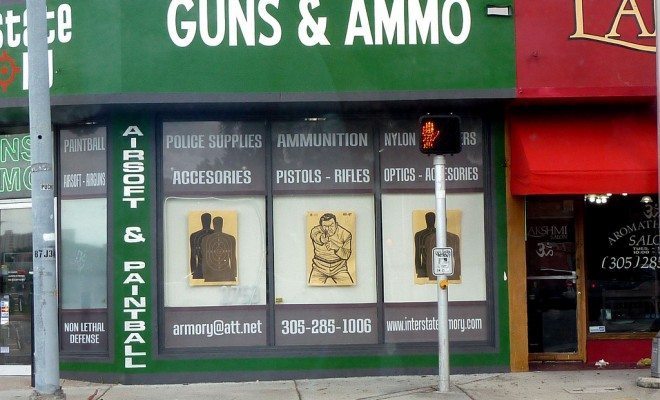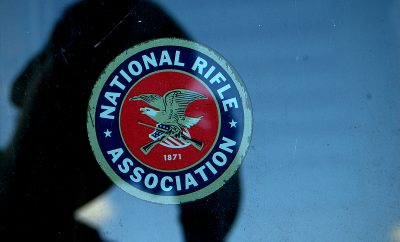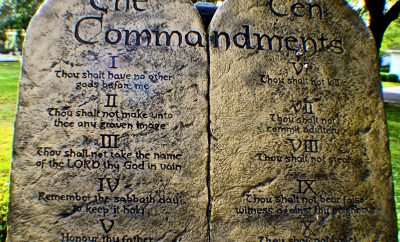 Image courtesy of [Lulu Vision via Flickr]
Image courtesy of [Lulu Vision via Flickr]
Society and Culture
It’s Time to Debunk Arguments Against Gun Control
The gridlock over American gun laws may actually be worse than the arguments over American healthcare. Whenever there is a mass shooting (defined in this post as four or more people killed), there are calls for stricter gun control, but those calls are never answered because an agreement on what to do is never reached. The voices against gun control are so loud and so rooted in paranoia in organizations like the National Rifle Association, that a meaningful solution seems impossible. We hear the same arguments over and over again, and over and over again, yet nothing is done and another act of gun violence occurs.
What people so adamant about the need for guns may not understand is that gun control–in all likelihood–will not take all the guns away. Instead, it will make the ability to obtain firearms much more difficult, and as we can see by looking at other countries who have successfully enforced such laws, the number of gun crimes will go down as a result.
“But we’re not like those countries!” Gun enthusiasts will say. “We’re America!”
Of course, they’re right. We aren’t like those countries. We’re larger, we have more guns per person, and damn it, our right to bear arms is right in our Constitution!
But when it comes to issues like this, when people are consistently losing their lives to gun-related crimes and accidents, the definition of insanity applies: doing the same thing over and over and expecting a different result is ridiculous. It clearly isn’t working, so is it so insane to want to change something?
When faced with such a massively divisive issue, I find it helpful to go straight to the facts. In his speech acknowledging the most recent mass shooting in Oregon, President Obama implored news organizations to focus on the numbers. Many have done just that.
According to the above video, since 1997, the United States of America has had 51 mass killings. 51.
This is unacceptable.
Now is the time that the anti-gun control camp will chime in with this solution: more guns will make us safer.
If more #sane #people were #armed #crazy #people would get off #fewer #shots #LetsGetWordy http://t.co/g5f2HAvQkM pic.twitter.com/Ay1HO0Fd70
— Pete Thompson (@earningamotorcy) August 15, 2014
Well wait a second, didn’t we just learn that there are over 88 guns to every 100 people in the U.S.? Is that not enough guns to, supposedly, be protected? And even if someone with a gun were on the premises of every mass shooting, the one doing the shooting initially has the advantage, and people will probably still die. Instead of encouraging more gun sales, maybe we encourage better gun safety: background checks into those wanting to buy firearms, mandatory registration for every firearm owned by a United States resident, and a more developed process for obtaining concealed-carry licenses in each state.
But the Second Amendment says “The right of the people to keep and bear arms shall not be infringed.” Isn’t a firearm registration system and stricter rules for obtaining guns infringement?
Here we find ourselves in a problem that applies to laws other than gun control: are the rules our founding fathers established still relevant in today’s society? In the case of owning a gun, not really.
You have to force yourself to think about society during America’s development: we were in the midst of a revolution, we had a much smaller population, and we were exploring new land to the west, so owning a gun to hunt for food and to protect yourself against enemy soldiers made sense. But what about now–in 2015? Gun control laws won’t take away your hobbies: heading to the gun range for target practice, or going quail hunting during its season. You will still be able to keep a gun locked up in your home for “protection,” so really, is the Second Amendment changing much? And if it did, would it really be a bad thing?
More than any other argument used to dismiss gun control, the one most often cited is “guns don’t kill people, people kill people.” That’s right: people wielding guns kill people. We do indeed have a mental health crisis in this country, but it is not necessarily related to the number of mass shootings. If asked to characterize a mass murderer, what would the identifiers be? Crazy? Mentally unbalanced? Maybe, but how can we possibly tell that ahead of time? The obvious answer to this is a mental health evaluation before being allowed to purchase a firearm. Even then, not all mass murderers are obviously unwell.
In fact, as John Oliver points out in the video below, fewer than five percent of gun-related killings are performed by mentally unwell people.
So what do we do about the gun problem we so obviously have in our country? It won’t be a simple solution, but at this point, any solution is better than nothing.








Comments